How Much Does Beef Brisket Cost at Costco
In most grilling and barbecue circles I frequent two of the most common places people look for high quality briskets are Costco and Snake River Farms. If you live in Texas there are a lot more options but for most of the country Costco and Snake River Farms are two places you can easily find USDA Prime Grade briskets. I was planning on cooking up two briskets on New Years Day so what they heck? Let's do a comparison of a prime grade brisket from Snake River Farms and a prime grade brisket from Costco.
Disclosure: This post is monetized with affiliate links. If you buy something through them I earn a commission which helps support this site and lets me buy more meat so I can write about it.
First off, let me make it clear that the Snake River Farms brisket I am talking about here is one of their USDA Prime briskets and not one of their American Wagyu briskets. Comparing one of the Wagyu briskets to a Costco Prime brisket would be like comparing a BMW to a Honda. Nothing at all wrong with a Honda but the BMW is just in another class.
Let's see the two contenders in this brisket comparison:
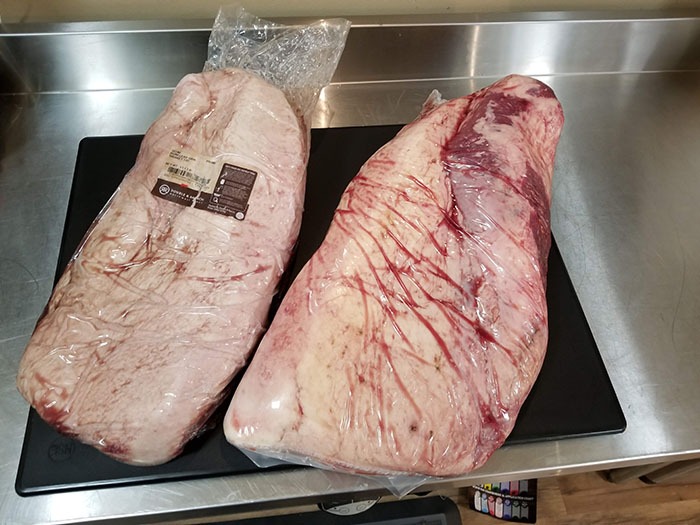
On the left is the Snake River Farms prime brisket and on the right is the Costco prime brisket. I was hoping to get two similar sized briskets for this test but when I went to Costco to get the brisket they only had 3 to choose from. The Snake River Farms brisket was 13.1 pounds and the Costco brisket was 19.28 pounds. Quite the size difference.
I regularly see 13 and 14 pound briskets at Costco but also see some 20+ lb monsters. The first lesson learned here is when you are at Costco and see a brisket you want go ahead and buy it even if you don't plan on cooking it any time soon. It will keep well in the freezer but in the cryobag it will also be just fine in the fridge for 30+ days.
Size-wise I generally prefer 13-15 pound briskets over larger ones. I think they tend to cook up a bit better and a bit quicker. But I was cooking for 20+ people so having a lot of brisket around wasn't the worst problem.
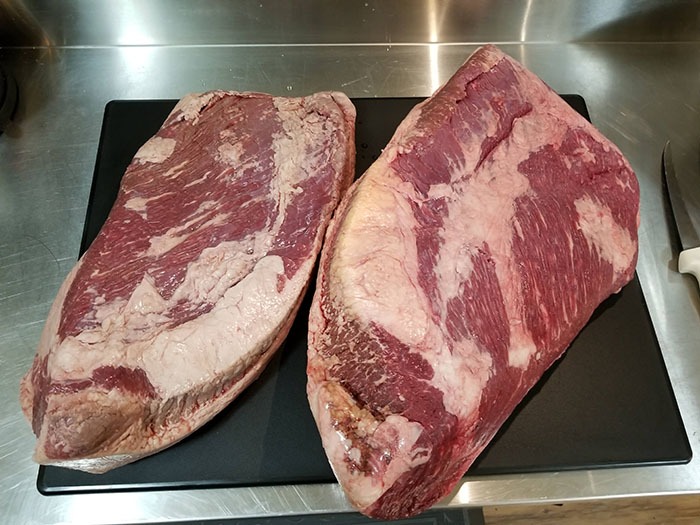
Trimming the Briskets
As I got these briskets out of the bags and started trimming them up there were some noticeable differences. Out of the bag the Snake River Farms brisket was a bit better overall shape and it was butchered quite a bit cleaner. There was still plenty of fat to trim off but the Costco brisket had some weird flaps of meat and a couple deep gashes in it. The Snake River brisket was nice and clean.
The fat cap on the Snake River Farms brisket was a bit thinner than the Costco one but due to the size difference that is to be expected. When picking a brisket the thickness of the flat is one of the first things I look at. Since the flat on the Snake River brisket was a bit on the thin side I left a bit more of the fat cap on it.
By no means am I an expert in trimming briskets (if you really want to learn how to trim briskets check out the Aaron Franklin Masterclass) and sometimes they look like I attacked them with a hedge trimmer but overall I was pretty happy with how these trimmed up. The Snake River brisket might have been my best trimming job yet.
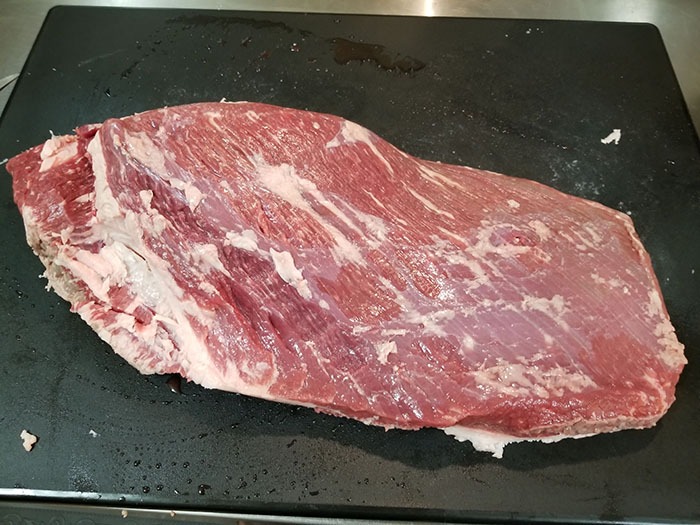
And here is another picture where you can see the thin flat:
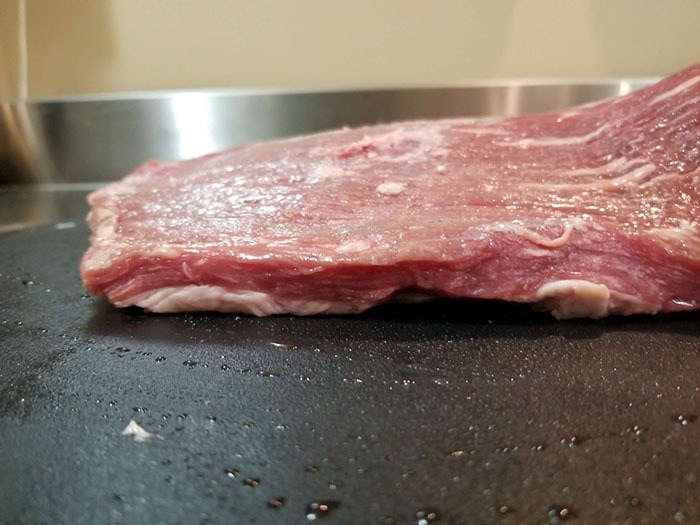
The Costco brisket didn't trim up quite as cleanly but it was still OK:
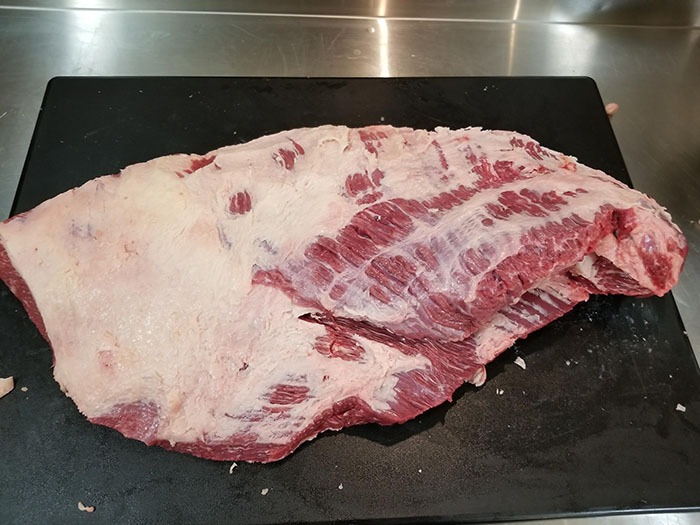
Like I mentioned the SRF brisket was a bit cleaner out of the package, was a better shape, and trimmed up a bit cleaner. I like briskets that are on the narrow side and the SRF brisket was much narrower than the Costco brisket, partially due to the size but the overall shape was quite a bit different too.
I seasoned the Costco brisket with about 1.5 ozs of kosher salt and about 1 oz on the SRF brisket (since it was smaller) and got them dry brining in the fridge. When it was time to put them on the cooker I gave them a quick rub of Franks Red Hot and covered them with black pepper.
Cooking the Briskets
Up until now most of my brisket cooks have been in the 225-250 degree range but I wanted to try these a bit hotter at 275 degrees which seems to be the "in" thing right now. I was planning on eating at 3:00 in the afternoon so wanted to give myself plenty of time to get these cooked and rested.
At 8:40 PM I got the Costco brisket on my Weber Ranch Kettle with two Slow n' Sear XLs loaded up with Weber briquettes and a few chunks of oak wood to give it some heat and smoke. Since this brisket was quite a bit larger I wanted to give it a head start on the cook. At Midnight I got the SRF brisket on and added a couple more wood chunks.
At about 4 AM the briskets were both temping at 185 degrees which is when I like to wrap in butcher paper. Some people wrap before the stall but I like to wrap after since it gives a bit better bark development. So I pulled the briskets, wrapped them, and put them back on. When I put the temperature probes back in however, the SRF brisket was only showing 165. I must have had the probe in a bad spot earlier. OK, so that one gets wrapped before the stall.
At 7:15 AM the Costco brisket was temping around 200 and was super tender when I probed it. The SRF brisket hit that point at 8:15. I have held briskets wrapped in the cooler for 6 hours but since we weren't eating until 3:00 (and people were an hour late) I ended up having to hold them for over 8 hours. When I got them out of the cooler and took their temperature they were still both at 145-150 degrees so still plenty warm. Good to know they can hold that long. I think the super long hold might have changed the meat texture a bit vs. briskets I have held for 3 or 4 hours but since each piece of meat is different it is hard to know.
Here are the finished briskets:

You can see the difference in the bark formation when you wrap before and after the stall. I like a lot of bark so I will definitely wrap after the stall when the briskets hit 180-185 if I wrap at all.
They were both still moist and had some great flavor. The Costco brisket had a bit smokier flavor but that was probably because there were a few more wood chunks going when it went on compared to when the SRF brisket went on the cooker. The overall flavor of the meat on the SRF brisket was maybe slightly "smoother" if that makes sense. Once you cover the briskets in salt, pepper, and smoke there isn't a ton of difference on overall flavor but there was some slight nuances to the SRF brisket that the Costco brisket didn't have.
One big kicker is the Costco brisket was $3.79 a pound and the SRF brisket was about $10 per pound. Was the SRF brisket over twice as good as the Costco brisket? Of course not. But I think it was a difference that is noticeable. 5% better? 10% better? Maybe something like that.
If you can get prime briskets at your local Costco (usually $3.49-$3.99 per pound) I would still go with those but if you are one of the unlucky people who can't get briskets at a great price at Costco and you have to spend $7 or $8 per pound at your butcher I think it would be worth the extra few bucks to get a Snake River Farms prime brisket.
I like to learn something every time I do a cook like this and here are a few things I learned this time. These are mostly just notes for me to look at in the future but maybe they will be helpful for you too:
- Snake River Farms briskets are a nice, clean shape
- Definitely wrap after the stall if at all
- A 19 pound brisket can cook in less than 12 hours at 275
- A 13 pound brisket might only take 8 hours
- If needed briskets can be held for over 8 hours with only minor degradation in quality
Bottom line is the SRF brisket is a higher quality meat and there is a difference in the two but not sure if it justifies the higher cost.
Source: https://completecarnivore.com/snake-river-farms-vs-costco-brisket/
0 Response to "How Much Does Beef Brisket Cost at Costco"
Post a Comment